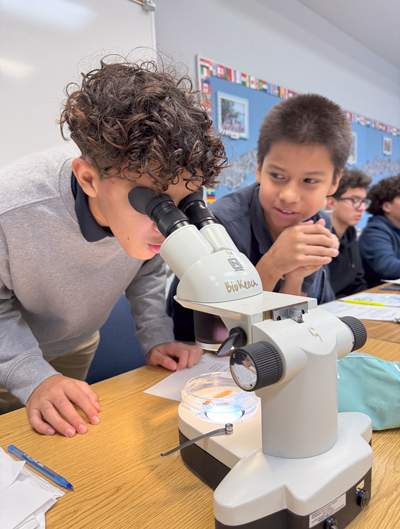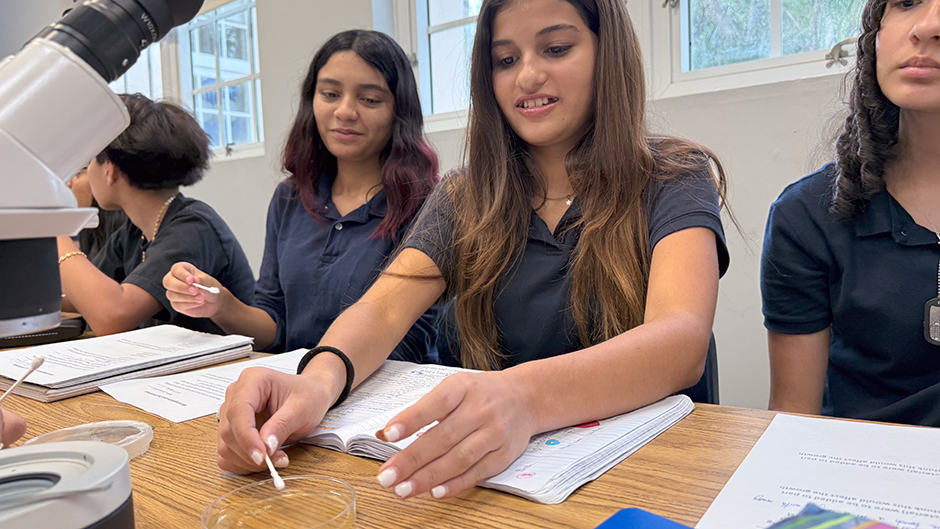On a recent Wednesday at Ponce de Leon Middle School, the students in Deepali Verma’s Honors Physical Science class excitedly swabbed the floor and their hands with Q-tips and wiped the Q-tips on petri dishes.
After waiting for the bacteria to grow, University of Miami biology graduate students Alma Reyes and Amanda Rawstern explained, they would photograph the petri dishes in their lab under a microscope so the middle schoolers could see the microorganisms up close.
Seventh grader Guiliana Seno predicted the photos would show overflowing petri dishes. “I think we’re going to see a lot because it’s the floor,” she said. “There’s a lot of bacteria.”
Eighth grader Dennise Andino, whose group had chosen to swab their hands instead of the floor, had a similar hypothesis. “Our Q-tip was really dirty,” she explained.
Verma, a University of Miami alumnus, said she was happy to see her students so engaged. “We love the BioReach program,” she said. “The kids are learning hands-on.”

Students examine an insect under a microscope during a BioReach activity. Photo: Mariana Espindola/University of Miami
Founded in 2017 by Alex Wilson, Michelle Afkhami, and Christopher Searcy, faculty members in the Department of Biology at the College of Arts and Sciences, the BioReach program was created to offer this type of hands-on learning to students in Miami. The program has partnered with six local elementary and middle schools, reaching more than 2,500 students and parents over the past few years.
“The best part of BioReach is seeing students get excited about science, asking lots of questions and making their own predictions,” said Afkhami. “It is so empowering for students to realize they can discover new knowledge. That experience plus interacting with actual scientists helps make science more interesting and accessible.”
In addition to leading science activities at local schools, the faculty and graduate students who participate in the program invite students to visit the University’s Coral Gables campus. They also host some evening events to which parents are invited.
Last fall, students from Richmond Heights Middle School spent the day in the college’s biology labs learning about zebrafish behavior, microscopic life, and invasive species. They also explored the John C. Gifford Arboretum.
“It’s fulfilling to see students engage with interactive activities and to know I’ve helped make science more approachable and exciting for them,” said Reyes, who has participated in the program for the past year.
During their recent visit to Ponce de Leon Middle School, Reyes and Rawstern, both Ph.D. students in Afkhami’s lab, gave the middle schoolers an overview of cells and microorganisms. They explained how microbes can benefit plants and animals but also cause diseases.
Then the students began the hands-on portion of the program, examining leaves and insects under microscopes on loan from the Department of Biology.
“I think it is important to expose kids to the variety of scientific careers available and show that we all come from unique backgrounds,” said Rawstern, who has participated in the BioReach program for the past four years. “It might spark an interest in them to continue understanding the world as future scientists.”
During the week Rawstern and Reyes visited Ponce de Leon Middle School, 270 students benefitted from the BioReach program. In addition to the microscopes activity, the students got to hold snakes and lizards as they learned about invasive animal species during an activity led by Searcy’s lab.
“Getting to touch the live animals is definitely the students’ favorite part of every program we put on, but we also take the opportunity to raise awareness about invasive species, as most invasive species come in through the pet trade, and thus public awareness is key to preventing future introductions,” Searcy said.
The Department of Biology hopes to establish an endowment to support the BioReach program, which is currently funded through the community outreach portion of National Science Foundation grants. To support the program, please contact Karina Alvarez at Karina.Alvarez@miami.edu.

